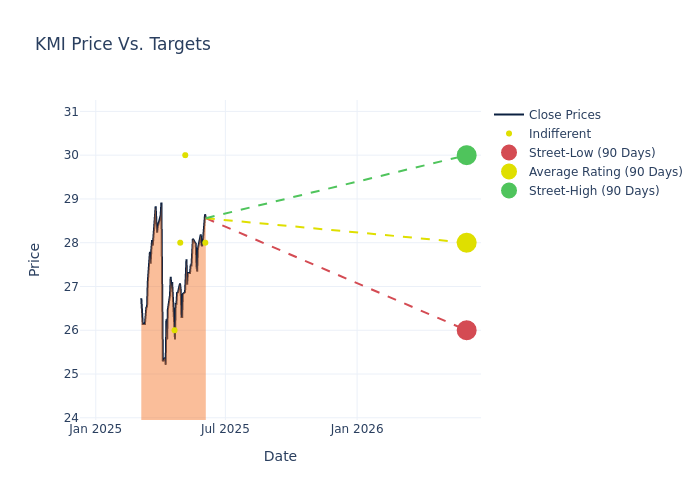Demystifying Kinder Morgan: Insights From 4 Analyst Reviews
Analysts' ratings for Kinder Morgan (NYSE:KMI) over the last quarter vary from bullish to bearish, as provided by 4 analysts.
The following table provides a quick overview of their recent ratings, highlighting the changing sentiments over the past 30 days and comparing them to the preceding months.
| Bullish | Somewhat Bullish | Indifferent | Somewhat Bearish | Bearish | |
|---|---|---|---|---|---|
| Total Ratings | 0 | 0 | 4 | 0 | 0 |
| Last 30D | 0 | 0 | 1 | 0 | 0 |
| 1M Ago | 0 | 0 | 1 | 0 | 0 |
| 2M Ago | 0 | 0 | 2 | 0 | 0 |
| 3M Ago | 0 | 0 | 0 | 0 | 0 |
The 12-month price targets assessed by analysts reveal further insights, featuring an average target of $28.0, a high estimate of $30.00, and a low estimate of $26.00. This upward trend is apparent, with the current average reflecting a 3.7% increase from the previous average price target of $27.00.

Exploring Analyst Ratings: An In-Depth Overview
An in-depth analysis of recent analyst actions unveils how financial experts perceive Kinder Morgan. The following summary outlines key analysts, their recent evaluations, and adjustments to ratings and price targets.
| Analyst | Analyst Firm | Action Taken | Rating | Current Price Target | Prior Price Target |
|---|---|---|---|---|---|
| Selman Akyol | Stifel | Raises | Hold | $28.00 | $27.00 |
| Jeremy Tonet | JP Morgan | Raises | Neutral | $30.00 | $29.00 |
| Elvira Scotto | RBC Capital | Raises | Sector Perform | $28.00 | $27.00 |
| Brandon Bingham | Scotiabank | Raises | Sector Perform | $26.00 | $25.00 |
Key Insights:
- Action Taken: Analysts frequently update their recommendations based on evolving market conditions and company performance. Whether they 'Maintain', 'Raise' or 'Lower' their stance, it reflects their reaction to recent developments related to Kinder Morgan. This information provides a snapshot of how analysts perceive the current state of the company.
- Rating: Analyzing trends, analysts offer qualitative evaluations, ranging from 'Outperform' to 'Underperform'. These ratings convey expectations for the relative performance of Kinder Morgan compared to the broader market.
- Price Targets: Analysts gauge the dynamics of price targets, providing estimates for the future value of Kinder Morgan's stock. This comparison reveals trends in analysts' expectations over time.
Capture valuable insights into Kinder Morgan's market standing by understanding these analyst evaluations alongside pertinent financial indicators. Stay informed and make strategic decisions with our Ratings Table.
Stay up to date on Kinder Morgan analyst ratings.
Get to Know Kinder Morgan Better
Kinder Morgan is one of the largest midstream energy firms in North America, with an interest in or an operator on about 80,000 miles of gas, refined products, and carbon dioxide pipelines. The company also owns one of the largest portfolios of gas and refined products storage and terminals. Most of Kinder Morgan's cash flows stem from fee-based contracts for handling, moving, and storing fossil fuel products.
Kinder Morgan's Financial Performance
Market Capitalization: Exceeding industry standards, the company's market capitalization places it above industry average in size relative to peers. This emphasizes its significant scale and robust market position.
Revenue Growth: Over the 3M period, Kinder Morgan showcased positive performance, achieving a revenue growth rate of 10.39% as of 31 March, 2025. This reflects a substantial increase in the company's top-line earnings. In comparison to its industry peers, the company stands out with a growth rate higher than the average among peers in the Energy sector.
Net Margin: Kinder Morgan's financial strength is reflected in its exceptional net margin, which exceeds industry averages. With a remarkable net margin of 16.81%, the company showcases strong profitability and effective cost management.
Return on Equity (ROE): Kinder Morgan's ROE falls below industry averages, indicating challenges in efficiently using equity capital. With an ROE of 2.33%, the company may face hurdles in generating optimal returns for shareholders.
Return on Assets (ROA): Kinder Morgan's ROA falls below industry averages, indicating challenges in efficiently utilizing assets. With an ROA of 0.99%, the company may face hurdles in generating optimal returns from its assets.
Debt Management: With a below-average debt-to-equity ratio of 1.07, Kinder Morgan adopts a prudent financial strategy, indicating a balanced approach to debt management.
How Are Analyst Ratings Determined?
Analysts are specialists within banking and financial systems that typically report for specific stocks or within defined sectors. These people research company financial statements, sit in conference calls and meetings, and speak with relevant insiders to determine what are known as analyst ratings for stocks. Typically, analysts will rate each stock once a quarter.
Some analysts publish their predictions for metrics such as growth estimates, earnings, and revenue to provide additional guidance with their ratings. When using analyst ratings, it is important to keep in mind that stock and sector analysts are also human and are only offering their opinions to investors.
If you want to keep track of which analysts are outperforming others, you can view updated analyst ratings along withanalyst success scores in Benzinga Pro.
Which Stocks Are Analysts Recommending Now?
Benzinga Edge gives you instant access to all major analyst upgrades, downgrades, and price targets. Sort by accuracy, upside potential, and more. Click here to stay ahead of the market.
This article was generated by Benzinga's automated content engine and reviewed by an editor.